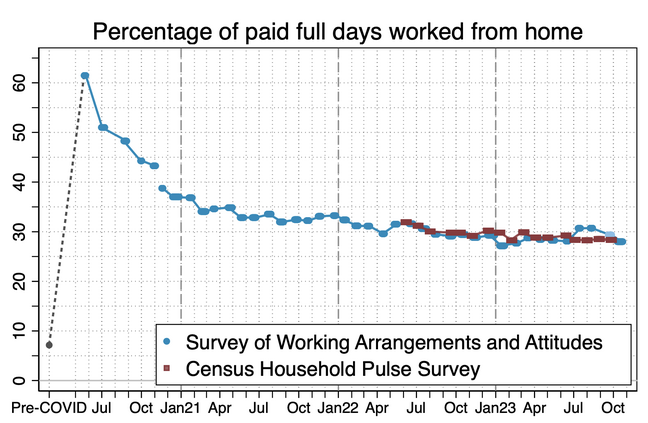'Return To Office' Declared Dead

Efforts to convince remote workers to return to corporate offices appear to have stalled, based on data from the government, academia, and private-sector organizations.
Stanford economist Nick Bloom this week went so far as to declare the death of "return to the office" – a campaign backed by those with real-estate commitments, commercial landlords, and cities deprived of labor force spending to undo the pandemic-driven pragmatism of working from home.
"Levels of WFH [working from home] were falling throughout 2020 to 2022, and office occupancy was rising," Bloom wrote earlier this week. "That trend ended in 2023, with both now pancake-flat. Return to the Office is dead."
Data from the US Census Household Pulse Survey, from Bloom's Working From Home Research Project and the Survey of Working Arrangements and Attitudes, and from commercial property services firm Kastle, he opined, all show the same flatlined trend.
Numerous large employers appear to prefer otherwise. IBM back in June 2020 – when COVID19 health measures were still common around the world – decided to share its "Return to Workplace Playbook" in an effort to provide employers with a roadmap to bring remote workers back into the fold.
Three years after publishing its playbook (and six years after it began trying to reduce remote work), IBM Software in September declared workers would be required to work from company offices at least three days a week. And other tech firms, like Apple, Amazon, Google, and Meta have issued similar directives.
Yet some employers, according to data from Envoy and Hanover Research, appear to regret their return-to-office strategies. And around 42 percent of companies, according to workplace consultant Unispace, have reported losing more employees than expected after my-way-or-the-highway mandates seem to have sent workers packing.
In a paper published in September entitled, "The Evolution of Work from Home," Bloom and co-authors Jose Maria Barrero (ITAM - Business School) and Steven Davis (University of Chicago) reported that as of mid-2023, 28 percent of paid full workdays among Americans 20-64 occurred at home. That's about four times the rate in 2019, and ten times the rate in the mid-1990s, they report.
- Videoconferencing fatigue is real, study finds
- Amazon to staff: Come into the office – it'd be a shame if something happened to your promotion
- Wipro: Get back to the office for three days a week or else
- Google ends partnership to build four San Francisco GoogleBurbs
Back in 2021, Barrero, Bloom, and Davis wrote a paper titled "Why Working from Home Will Stick," in which they argue that support for remote work brings benefits for both employers and staff. While workers may demand at least some remote work option, it's employers who really stand to benefit from being flexible about work arrangements, the writers claim.
"The rise of remote work makes it easier for firms situated in high-wage areas to recruit and employ staff in areas with lower wages," the trio of economists note in their Evolution of Work paper.
"There is also evidence that quit rates and turnover costs fall when a firm lets its employees adopt hybrid working arrangements. And standard economic models imply that the rise of remote work puts downward pressure on real wages through labor supply effects."
Unless the goal of return to the office mandates is actually to drive workers to quit in order to avoid layoffs and severance pay – as has been alleged in some cases – it's hard to see why corporate managers would reject remote work when that brings greater access to talent, reduced turnover, lower property cost obligations, and greater productivity. ®
From Chip War To Cloud War: The Next Frontier In Global Tech Competition
The global chip war, characterized by intense competition among nations and corporations for supremacy in semiconductor ... Read more
The High Stakes Of Tech Regulation: Security Risks And Market Dynamics
The influence of tech giants in the global economy continues to grow, raising crucial questions about how to balance sec... Read more
The Tyranny Of Instagram Interiors: Why It's Time To Break Free From Algorithm-Driven Aesthetics
Instagram has become a dominant force in shaping interior design trends, offering a seemingly endless stream of inspirat... Read more
The Data Crunch In AI: Strategies For Sustainability
Exploring solutions to the imminent exhaustion of internet data for AI training.As the artificial intelligence (AI) indu... Read more
Google Abandons Four-Year Effort To Remove Cookies From Chrome Browser
After four years of dedicated effort, Google has decided to abandon its plan to remove third-party cookies from its Chro... Read more
LinkedIn Embraces AI And Gamification To Drive User Engagement And Revenue
In an effort to tackle slowing revenue growth and enhance user engagement, LinkedIn is turning to artificial intelligenc... Read more


